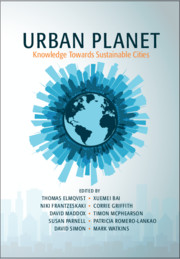One of the stated big questions of this book is to ask what kind of knowledge is needed for smart urban environmental decision-making. This is an important question to ask, especially for long-term researchers looking to plan scientific activities over many years.
I work as science support for the Nature Conservancy’s urban sustainability program. At any given time, we have projects in nearly 50 cities all over the world, with goals ranging from biodiversity protection to ecosystem service provision to youth empowerment. So while I still have (I hope) one foot in the world of academia, I also have another foot firmly in the world of the conservation practitioner. In the course of my job, I interact with municipal policy-makers, and work with Nature Conservancy staffers that live and work in these communities.
In all these conversations, I have never heard anyone working for a municipality ask to “coproduce” scientific knowledge with us. Many of these practitioners may not even know what this concept means. Similarly, the debate about whether good science should be interdisciplinary or transdisciplinary would seem sterile and boring to most policy-makers and planners. It isn’t that these aren’t good ideas – indeed, the best urban sustainability science projects involve deep involvement of those who would use the knowledge created. When setting project goals, having decision-makers involved ensures the sustainability science projects are asking the right questions. While designing the methodology, it is vital to make some practitioners understand and agree with the science methods used. And of course, while choosing how to communicate results, involving decision-makers ensures that they have a greater impact on decision-making.
The problem is that academics sometimes find it fascinating to study the process of collaboration itself. Academics can write whole papers on the process of the coproduction of knowledge, transdisciplinarity, and so on. We can then debate which theory about process is most effective, or sharpen the semantic differences between different theories. This is normal and healthy for an academic discipline, but every day spent studying the process is a day not spent creating practical knowledge that a city can use.
I am skeptical that there is a universal answer to what knowledge cities need, but I would much rather ask decision-makers themselves, “What knowledge do you need in your city?”
The quest for universal answers is, of course, part of science. But I doubt our ability as scientists to gaze into our crystal balls, our scenarios and models, and divine what the distant future will bring. The pace of technological and social change is so rapid that we have to have a lot of humility about our long-term predictions. I would much rather say we ask practitioners what decisions need to be made in the short term and what information is needed to inform those decisions. I am not saying that studies of the process of being relevant are not important. I just want to reserve a place in urban sustainability for works that answer the short-term, pragmatic questions that decision-makers have in a timely way. This work is sometimes not theoretically interesting, in the sense of creating brand new methods or models. Sometimes it just means taking existing information (for instance, forecasts from climate change models) and presenting it in a format that supports municipal decision-making. This is not the kind of science work that makes for novel, cutting-edge journal papers, perhaps. But it is often what urban managers and decision-makers actually need.

